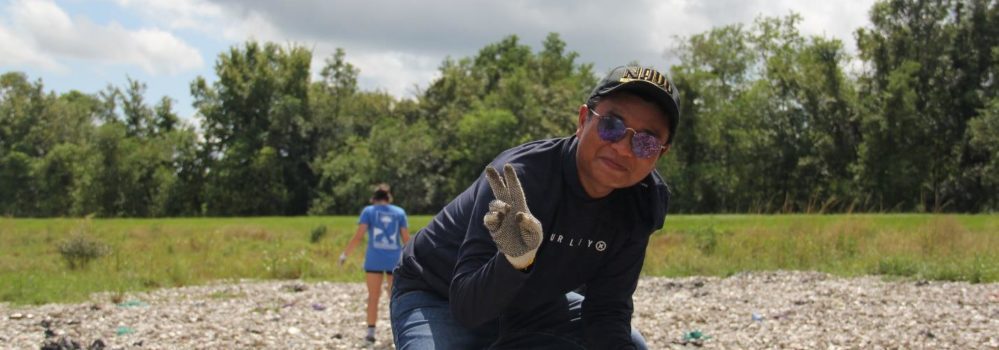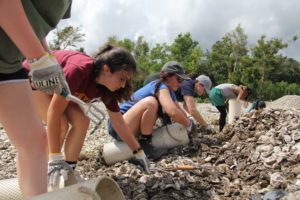
CRCL leads trip for future coastal leaders
By Corey Miller, Director of Community Resilience – Coalition to Restore Coastal Louisiana
On a warm day nearing the end of summer, a group of Louisiana high school and college -aged residents embarked upon a day-long excursion of learning and volunteering in support of coastal restoration. We began the voyage with an early morning charter bus pick-up in Baton Rouge, LA as the LSU Tigers and Southern LA University football fans were starting their day of tailgating. Meeting up with the rest of the group in New Orleans, we set off traveling down-river into St Bernard Parish.
The Coalition to Restore Coastal Louisiana (CRCL) developed our Future Coastal Leaders (FCL) program to provide extracurricular, experience-based learning about the impacts of wetland loss and climate change and ways that participants can play a role ensuring a better future for our coast. On this specific day, the FCL program was hosting a kick-off and recruitment field trip that included stops at significant restoration sites, a local foundation’s facilities that promote environmental stewardship, and CRCL’s Restoration Headquarters.
On a comfortable bus with 25 trip attendees and a handful of CRCL staff, we started the day by heading to CRCL’s restoration headquarters, located about 20 min downriver from New Orleans. Once there, we put in a few hours of volunteer restoration to support the development of a living shoreline protection project. CRCL’s Oyster Shell Recycling Program (OSRP) collects shell from New Orleans area restaurants that would otherwise end up in a landfill. We take that shell to our Restoration Headquarters where we engage volunteers to prepare it for deployment along Louisiana shorelines so that it will:
- 1. Become a physical structure that knocks down waves to lessen the rate of wetland erosion.
- Attract new oyster growth from natural reproduction.
- Provide a vertically accreting, living oyster reef that supports habitat for more oysters, finfish, shrimp, crabs, and other marine life.
 After putting in some sweat equity and enjoying a cold-cut poboy lunch, the group headed down to the Caernarvon Freshwater diversion project to learn about the important function of the Mississippi River in maintaining our estuaries. The diversion, constructed in the early 1990s, helps to maintain a salinity gradient from the freshwater cypress and tupelo swamp habitat all the way down to our salty barrier islands. As a result of the project, CRCL is able to engage volunteers in planting trees on newly emerging delta splays, land being formed from the sediment carried by the “Muddy Mississippi River”.
After putting in some sweat equity and enjoying a cold-cut poboy lunch, the group headed down to the Caernarvon Freshwater diversion project to learn about the important function of the Mississippi River in maintaining our estuaries. The diversion, constructed in the early 1990s, helps to maintain a salinity gradient from the freshwater cypress and tupelo swamp habitat all the way down to our salty barrier islands. As a result of the project, CRCL is able to engage volunteers in planting trees on newly emerging delta splays, land being formed from the sediment carried by the “Muddy Mississippi River”.
Thereafter, the bus headed back upriver, stopping at Meraux Foundation’s Docville Farm. The foundation and facilities play an integral role promoting coastal stewardship and investing in local projects that both spread awareness about coastal land loss and actively restore the coast. The trip culminated with a visit to the 40 Arpent Wetland Observatory to see a once-vibrant cypress swamp that has turned to open water but with hope and plans for restoration!
